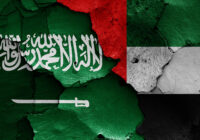The challenges of sustainable economic growth and meaningful employment are common throughout the Middle East and North Africa.
Lebanese Prime Minister Saad Hariri, at the recent opening of a workshop on the digital economy, pointed out that “digitization is one of the primary building blocks for national prosperity.” He added that “a digitized nation is simply more intelligent and we all need to work together, cooperate and coordinate on this issue.” His words echo realities from Tunisia to the Gulf, that to empower a nation’s entrepreneurs, create valued jobs and launch sustainable entities, it is critical to not only incorporate new technologies and business practices, but to build a new consciousness of the role of entrepreneurs in the transformation of their countries.
At the same event, the World Bank’s regional director of the Middle East department, Saroj Kumar Jha, added: “We are very concerned that unemployment in the country is increasing and in my view, technological transformation creating more enabling conditions for the businesses, more investments to come to the country, will really create the opportunities so that more Lebanese minds can be really at work. And that is good for Lebanon but also for the region and globally.”
The challenges of sustainable economic growth and meaningful employment are common throughout the Middle East and North Africa, yet available programs centered on subsidies and grants seldom build sustainable businesses. What is needed is to incorporate digital transformation as a tool to both redefine transactional relations and create a values-centered approach that considers relationships with the customer, community and employee as central to the company’s mission, not an intellectual leap for societies built on group identities.
Ongoing disruptions in Tunisia and Algeria are symptomatic of the reality that young people are not wedded to older business models, nor to the ways in which generations and communities have interacted. While interested in making profits, many have a broader vision of gaining and serving, ironically a strong theme in both Islam and Protestantism. Both emphasize that God blesses the fortunate so they can assist those in need. In fact, the building of many US public libraries, schools and community centers during the 1880s-1920s were largely driven by affluent practitioners of “do unto others…”
21 Lessons
Looking at the future of employment, business development and careers, one is struck by the ambiguous nature of work generated by the intersection of artificial intelligence, digital transformation, organizational disruption, robotics and biometrics, which are arguably shifting us toward greater degrees of uncertainty. This is certainly one the of the key themes in 21 Lessons for the 21st Century, which is a tour de force in dissecting the qualities that individuals need to acquire to survive — the top two of which are mental stability/flexibility and emotional intelligence. The author, Yuval Noah Harari, emphasizes the importance of spirituality and empathy as personal qualities that will enable us to adapt to the constantly changing realities of work and life in the coming decades.
On the organizational level, this need for a values-driven approach that supports the building of social impact ventures profitable for the company, the community and the planet is no less of an imperative. While different economies will exhibit various capacities and capabilities over time, the demands for responding to customer, community and environmental conditions are becoming essential to survival in the next 30 years.
A report on the International Labour Organization’s (ILO) latest assessment of trends in the global workforce quoted Guy Ryder, director general of the ILO, who noted: “There is an increasing need for cognitive skills, a readily adaptable workforce, which coupled with the growing complexity of job tasks, will increase the demand for workers with strong core skills and motivation to learn and adapt throughout their professional careers.” In echoing what Harari emphasizes, he added: “We understand that the front-loading of qualifications for a whole lifetime doesn’t work anymore. We need to replenish skills throughout a working career, and this calls for revisiting the models and concepts of lifelong learning to create the future we want.”
While much of the transformation debate is about how to rethink our educational system to prepare our young people to survive and thrive over and over again, given the accelerated pace of change in coming generations, it is essential for organizations, companies and other entities to recognize one key thing. As a McKinsey article puts it: “Transformational change is hard. There’s no doubt about it. Successful leaders align their teams behind them. They target the bad, old habits that represent the past, and they tackle the mind-sets in the organization that stand in the way of fundamental change. In that way, they change the odds in their favor and ensure that their transformation succeeds.”
This is as true for governments as it is in the private sector. Entrepreneurs and promoting an entrepreneurial mindset that integrates big data, a sense of discovery and the discipline demanded for success in the marketplace can serve as a bridge to helping governments realize the potential of their citizens in an inclusive and equitable society. Therefore, what is happening in Algeria and Tunisia are harbingers of the passing of the old and the ushering in of a new dynamic that cuts across political, economic and social change.
*[This article was crossposted on International Policy Digest.]
The views expressed in this article are the author’s own and do not necessarily reflect Fair Observer’s editorial policy.
Support Fair Observer
We rely on your support for our independence, diversity and quality.
For more than 10 years, Fair Observer has been free, fair and independent. No billionaire owns us, no advertisers control us. We are a reader-supported nonprofit. Unlike many other publications, we keep our content free for readers regardless of where they live or whether they can afford to pay. We have no paywalls and no ads.
In the post-truth era of fake news, echo chambers and filter bubbles, we publish a plurality of perspectives from around the world. Anyone can publish with us, but everyone goes through a rigorous editorial process. So, you get fact-checked, well-reasoned content instead of noise.
We publish 2,500+ voices from 90+ countries. We also conduct education and training programs
on subjects ranging from digital media and journalism to writing and critical thinking. This
doesn’t come cheap. Servers, editors, trainers and web developers cost
money.
Please consider supporting us on a regular basis as a recurring donor or a
sustaining member.
Will you support FO’s journalism?
We rely on your support for our independence, diversity and quality.






